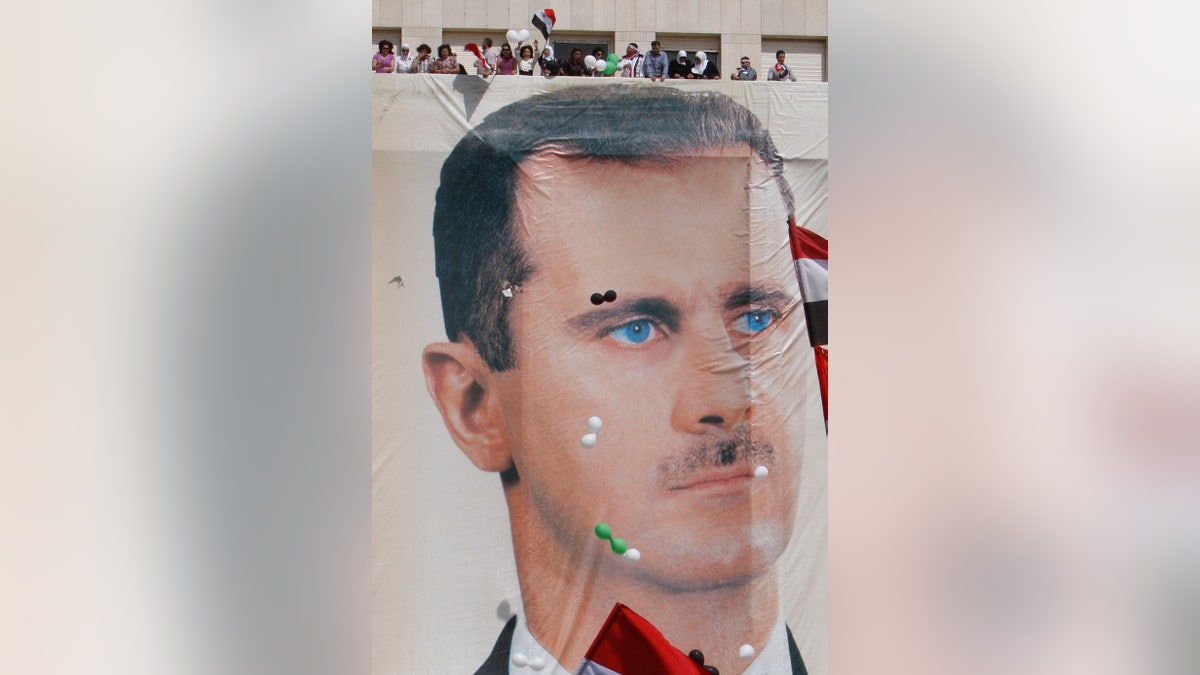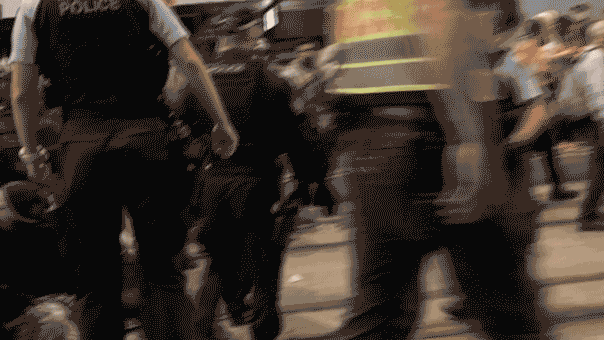
Syrian regime supporters stand on a roof as balloons float near a huge portrait of Syian President Bashar Assad during a demonstration to show their support for their President and to thank Russia and China for blocking a U.N. Security Council resolution condemning Syria for its brutal crackdown, in Damascus, Syria, on Wednesday Oct. 12, 2011. (AP2011)
BEIRUT-- Syrian troops clashed Thursday with armed men believed to be military defectors in a southern village and a northwestern town, killing at least 13 people in the latest sign that the 7-month-old uprising against President Bashar Assad is becoming increasingly militarized, activists said.
The troops stormed the northwestern town of Binnish with more than 50 vehicles and the sound of explosions and gunfire could be heard. The London-based Syrian Observatory for Human Rights and another activist group, the Local Coordination Committees, said five people were killed.
Rami Abdul-Rahman, who heads the observatory, said six soldiers and two defectors were also killed Thursday in the southern village of Harra in the Daraa province. He said an army force appears to have been ambushed in Harra's main square. Villages and towns in the Daraa province, where the uprising began, have been a hotbed of anti-regime protests from the beginning.
Binnish is part of Idlib a province, which borders Turkey, an area where there have been clashes between the military and army defectors for months. After months of mostly peaceful protests, the growing involvement of military defectors in confrontations has raised fears that Syria may be sliding toward a civil war.
The uprising against Assad's regime began in mid-March amid a wave of anti-government protests in the Arab world that toppled autocrats in Tunisia, Egypt and Libya. Assad has responded with a fierce crackdown, which the U.N. says has left nearly 3,000 people dead.
Syria's opposition movement has until now focused on peaceful demonstrations, although recently there have been reports of protesters taking up arms to defend themselves against military attacks.
An amateur video posted online by activists showed Syrian troops smoking cigarettes in an armored personnel carrier. A man could be heard in the background saying "Assad's army enters the city of Binnish on the morning of Thursday 13/10."
Graffiti on the vehicle read "93rd Brigade" and "Bashar only."
Also Thursday, Suleiman Haddad, a member of the outgoing parliament and senior official with Assad's ruling Baath party, said a committee was formed to amend the constitution. He added that the new constitution will need to be ratified by parliament and later through a referendum.
Since the uprising began, Assad made promises of sweeping reforms but most have not been carried through and the opposition says they will accept nothing short of his departure.
In the early days of the uprising, many Syrians wanted section eight of the constitution amended. The section states that the Baath party is the leader of the nation and the society.
The amendment of section eight would open the way for the formation of parties besides the Baath and 11 other closely associated parties known as the National Progressive Front.
The Baath party has been in control of the country's politics after members staged a coup and took power in 1963. Since then the party extended state authority into virtually every aspect of life.
Another senior Baath party official, Fayez Sayegh, said the new constitution will define the presidential term and presidential elections.
Syria has not had presidential elections in decades. Every seven years, a referendum is held during which Syrians chose whether they approve the president or not.
Assad and his late father, Hafez, whom he succeeded after his death in 2000 used to get overwhelming majority in the referendums where no candidates ran against them. The last referendum was held in 2007 during which Assad won 97.62 percent of the vote.
Still, all such amendments are not likely to appease the opposition that has said it will not accept anything less than regime change.








































